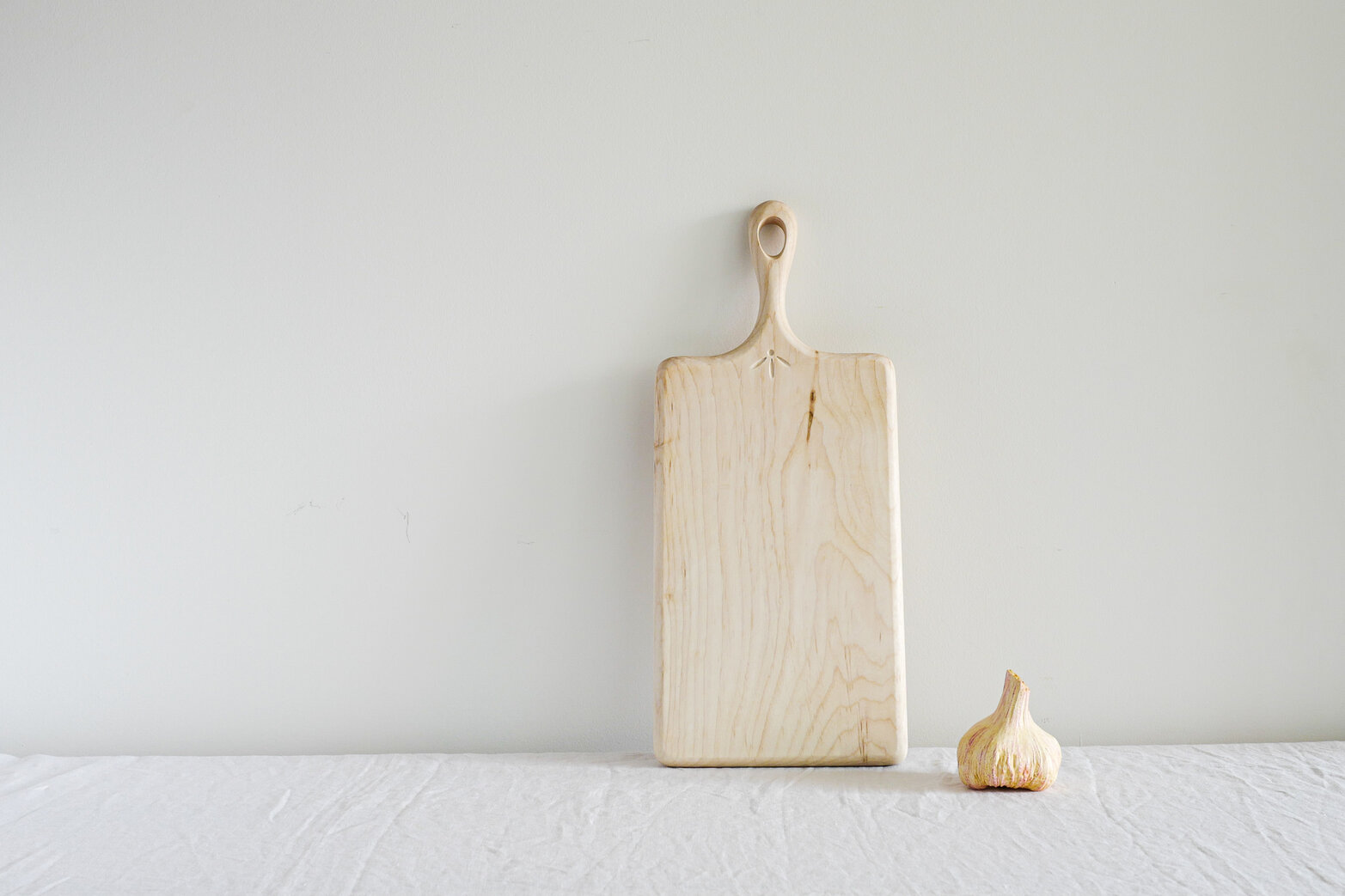Posted in Journal
Resonance with Nature

Sliced through, wood reveals the passing of time. Seasons of growth, moments of change and reforming are recalled by the interior rings and shifting tones. From the forest to the table.
For a long time after kitchens became more central to our homes, no longer tucked into the corner and restricted to unseen work, time and ageing processes were banished from modern kitchens. In their place, the sterile, easy-wipe, unchanging environments offered by plastics, silicones and stainless steel prevailed. Today, we witness a slow cultural shift towards re-appreciating traditional, natural and handmade kitchen goods, from earth wares and bone-handled knives to wooden platters, bowls and boards.
Reconnection with the practice and notion of handmade goods is what drives Joshua Vogel of Black Creek Mercantile & Trading Co., makers of a wide range of wood products including beautiful boards.
Far from a sterile product, handmade wooden boards are rich with the imprecision and personality of the wood and craftsmanship of their making. For Joshua Vogel, handmade goods are quite simply all about the hands. He sees an innate value and intimacy in an object passing directly from the hands of the maker to those of the user. But he sees beyond that too, creating pieces to last not just for years, but to be handed down for generations to come. These enduring pieces are shaped from sustainably harvested domestic hardwoods, each with their own unique patina and grain. The boards achieve a kind of posture and poise, a silence that recalls the time spent in deep study of the natural beauty of these native trees, from black walnut and sycamore to white oak and maple. Beyond function and connection, these boards bring warmth and life into the kitchen.

Hampson Woods was also formed from the idea of bringing affordable craft pieces into people’s homes and everyday lives. Hand-carved in their Cumbria workshop from a single plane of ash, sycamore or elm, the boards have no joints to come apart at, no inherent weak points or reliance on additives such as glues. With their softened edges, the rounded necks of the handles crane away slightly to balance the weight when they are carried. In the palm of the ash carving board, a traced leaf detail collects the juices that flow from a freshly carved Sunday roast or a ripe stone fruit.
Maintaining a wooden board is simple but intimate physical work: the soft pressure of oiling, the scents released, the circular motion of buffing. Perhaps the physicality of these maintenance rituals intensifies the deep satisfaction that comes from oiling a board, seeing it nourished and its deep colour reinvigorated. In use, a wooden board gathers character through its scratches. The marks of a knife rocking over the surface write another tale of time over the older knots and rings of the wood.
The value of natural pieces isn’t only in the aesthetic and quality of the product. Each piece foregrounds the connection between our everyday lives and communities and natural environments around us. Each wooden board begins as a tree, nurtured and grown to full strength, before being selected, felled, and eventually carved into a specific piece. Recording this lineage, each Hampson Woods board is adorned with a label describing the provenance of the wood. Sourced from small independent merchants connected to woodland management systems, each board can be pinpointed the whole way back to a specific tree. With the entire lifecycle traceable and shared, homeowners are connected not only to the craftsmen who formed their pieces, but deeper, back to the growing forests.

For Andrea Brugi, this connection of what he makes with how and where he makes it is fundamental. Growing up surrounded by olive groves in Tuscany, Brugi fell in love with the construction and reconstruction of the old houses in the hilltop villages he visited with his father. Today, the interwoven smells and stories of these places, materials and memories fold into the objects he and his wife, Samina Langholz, make together. Their collaboration is natural and easy, stemming from a mutual respect for the wood and a pulling together of his rustic roots with her more minimal Scandinavian aesthetic.

Passion for the simple life and resonance with nature is at the forefront of their work. One of their iconic pieces, an olive cutting board, is made from local 400 to 1000 year old Tuscan olive trees. Protected for as long as they continue to fruit, the trees can only be felled when their fruit-bearing days are over. At that point they are ready to take on another life, to be shaped into boards for cutting and serving. The specifics of each now ancient piece of wood, wrought over centuries, inspires and determines the design. From other woods they create highly specific tools: polenta boards and egg plates, pizza boards and sculptural bowls hand-carved from the roots of the olive tree. Where a piece cannot be finished from a single piece of wood, or a natural crack is too large, they use refined versions of traditional jointing techniques, celebrating the special aesthetic of a butterfly or biscuit joint. Their practice is a window into the continuity of life.
Over time, a wooden board takes on the patterns of its use, bearing the marks of the meals made and shared. Central to the practice of preparing and cooking, a wooden board hovers between the mundane and the unique, the precious and the everyday. With each board being traced back to a different tree and a different hand, notions of time, nature and craft are recalled with every use, bringing us closer to the places we live and the communities we connect with. When we use wooden boards, we find ourselves dreaming of whole forests from the sanctuaries of our kitchens.





